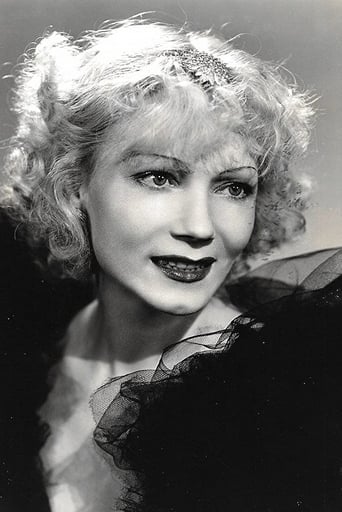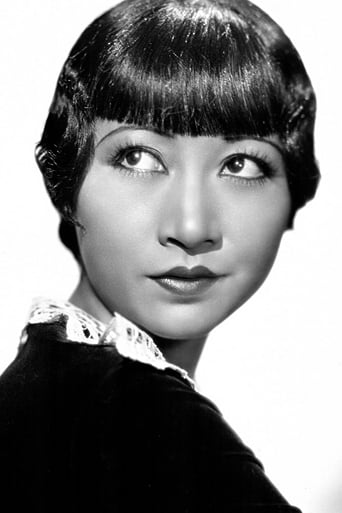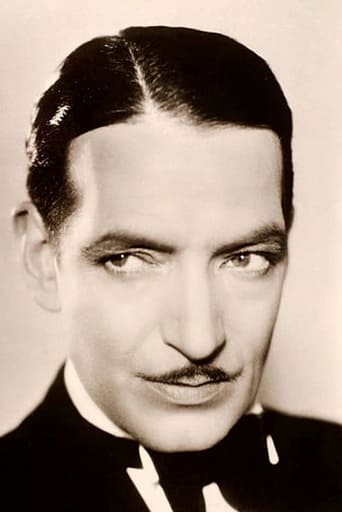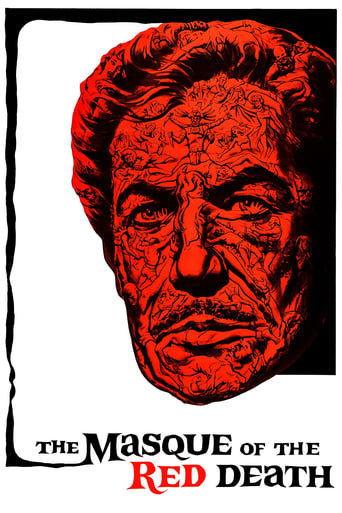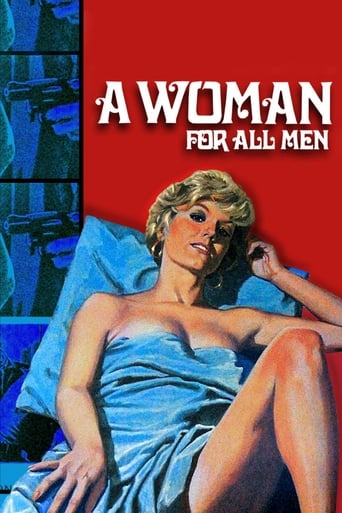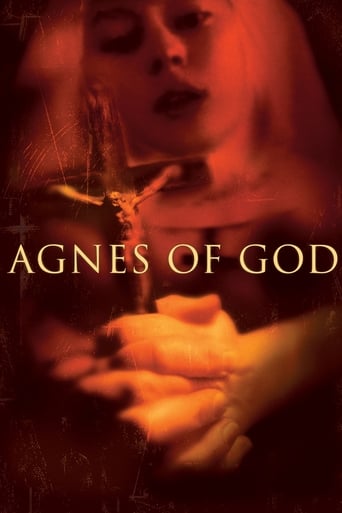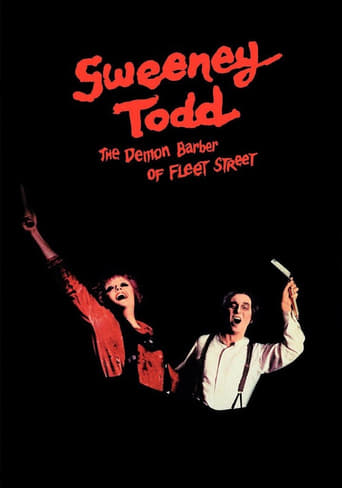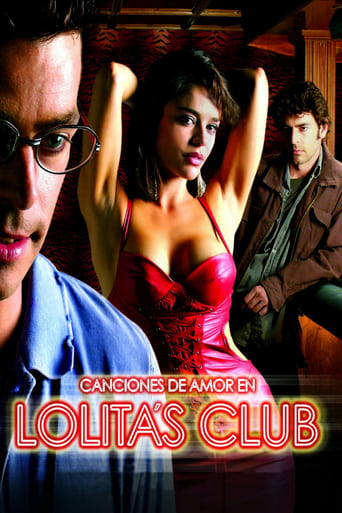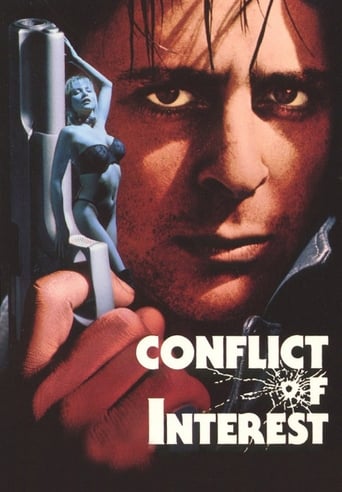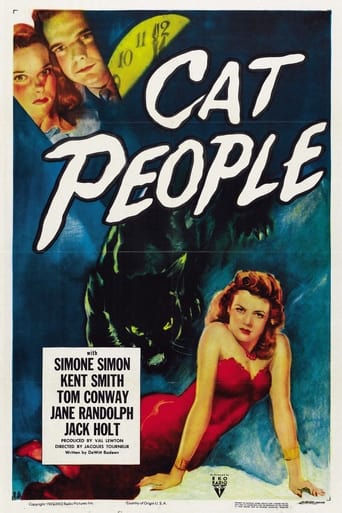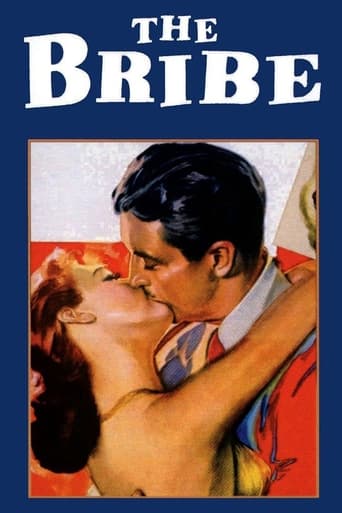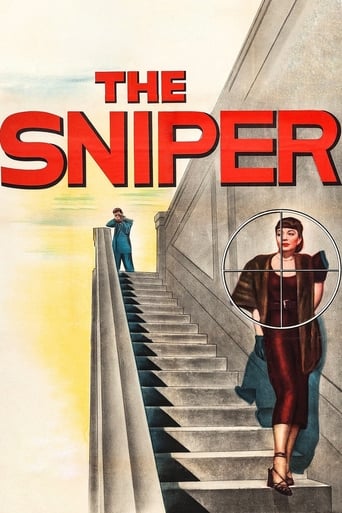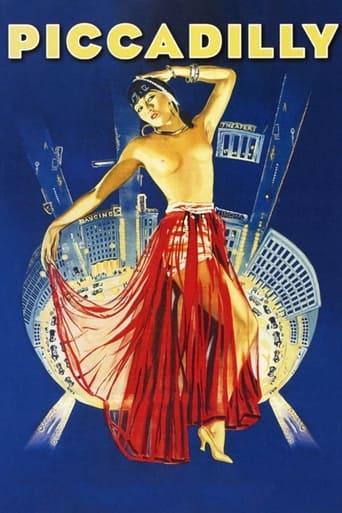
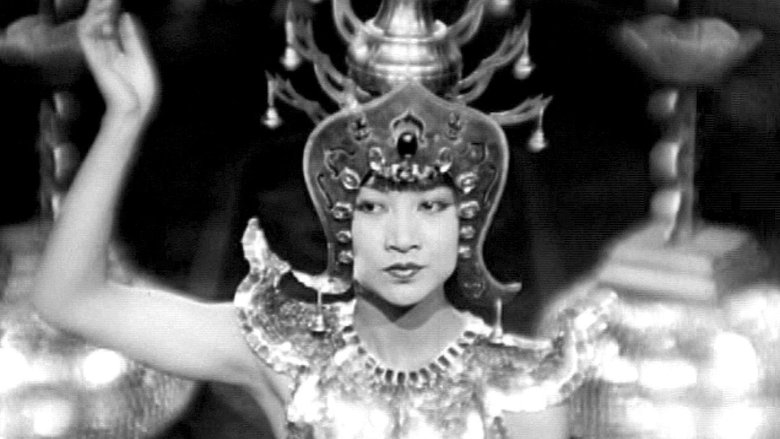
Piccadilly (1929)
A young Chinese woman, working in the kitchen at a London dance club, is given the chance to become the club's main act.
Watch Trailer
Cast


Similar titles
Reviews
Very very predictable, including the post credit scene !!!
best movie i've ever seen.
Although it has its amusing moments, in eneral the plot does not convince.
The tone of this movie is interesting -- the stakes are both dramatic and high, but it's balanced with a lot of fun, tongue and cheek dialogue.
Thought I'd see this because of the praise of Anna May Wong. Boy, was I disappointed!! Did not think she was attractive at all. Not wowed by her dancing, either. Her figure was like a boy's, but I guess that was the ideal female in the roaring 20's.
This is an absolutely superb film, far too little known and still much underestimated. It is of particular interest as it was made on what you might call the fragile border of the European cinema tradition in the land that has so often, politically, economically and culturally been the Continent's US "Trojan Horse". But it was made at a particular moment when the British had, briefly at any rate, partially escaped their infeodation vis-à-vis the United States and become more open to tbe influence of other European cinema. It was a period (1928-1933) when a real effort at inra-European co-operation was being made (at least in th world of cinema), when there were many co-productions, often resulting in multiple versions of films in different languages (mainlyl French, German and English) and with slightly different casts in each country.Although this film does not come in that category, it was one of several films made in Britain at this time by German directors, which clearly show the influence of German cinema, in the superb cinematography, in the emphasis on "ensemble" acting, in the relatively slow pace and, for most of the film, lack of melodramatic action. The editing and the use of close-up, in the European manner, does not privilege "continuity" (ping-ponging backwards and forwards between the characters in the classic US fashion) but instead concentrates on "connectivity" (psychological and thematic relevance). The influence of naturalism (most strongly associated with Germany at this time under the name "neue Sachlichgkeit" or "new objectivity") is there, in, for instance, the fine scene set in a lower-class London dance-hall. Subjects are introduced that would have been taboo for US film-makers (the raising of the issue of racial prejudice and racial segregation in that same scene)and, while the style is delightfully elliptical and non-explicit, the film has a sexual pulse that is again typical of European film, while US equivalents rarely rise above mild prurience.Dupont was a fine director both with regard to cinematography and with regard to acting and this is clear from the performances he elicits from all the principals, in all there cases better performances than they would produce or, in where Wong was concerned, be given the chance to produce, in any other films. Since the comparison with Von Sternberg has been raised by other viewers, I have to say that I find Piccadilly distinctly superior to any of Von Sternberg's silent films and better indeed than anything Von Sternberg ever did with the exception - admittedly a very notable one - of his one German film, Der blaue Engel. If Dupont's career went down the drain it was through little fault of his own. Both he and Anna May Wong were notable casualties of the restrictive US system and in both cases it represented a shameful waste of talent. Wong's story is well known - how racism and stereotyping ensured that she never came near to fulfilling her potential.Dupont was a casualty of a certain Herr Hitler who took it into his head to destroy what was, to my mind incontestably, the finest cinema industry of the world at the time. He became part of the great exodus of talent from Germany that would be the US' great gain but a gain it often did not know how properly to profit from. While it is true some German/Austrian/Hungarian expatriates had little problem with the restrictive nature of Hollywood cinema, notably "the playboy Lubitsch" (as Graham Greene once called him, who had come to the US rather earlier (1926) and of his own accord and could adapt to anything. Eclectic directors who did not much mind what they worked on or how it was chopped about (Michael Curtiz for instance) fared well enough. Younger directors, who had had relatively little experience of the German system (Billy Wilder for example) also adapted without problems.But for many the US experience was something of a nightmare after the much freer and more expressive cinema world they were used to. Even F. W.Murnau who came at around the same time as Lubitsch and been given unusual lattitude because he was regarded as such a valuable "catch", after making one of his best films (Sunrise), soon found himself at continual loggerheads with the US production system. Fritz Lang, whose first US film, Fury, is also arguably the best of those he made there, had a successful enough career on the surface but talked long and often of the bitterness and artistic frustration he felt over his US experience. Dupont, who had had little success with an earlier US film (1927), was not regarded as a "catch" in the same way and found himself relegated after 1933 to the making of B-films. It is possible to make excellent B-films (another expatriate Edgar Ullmer is a fine but rare example) but it was not easy and required a very particular, almost perverse, talent that Dupont lacked. Sickened by the experience, he abandoned directing almost completely in 1940 (making only a couple of bread-and-butter films again at the end of his life.It is rather fitting that, in 1929, Britain, a sort of halfway-house in some sense, should have provided a haven both for Dupont and Wong to show what exceptional talents they both were.
2004 was a very good year for fans of the actress Anna May Wong. It saw a Wong retrospective here in NYC's Museum of Modern Art, the first biography about Ms. Wong, by Graham Russell Gao Hodges, AND the rerelease of 1929's "Piccadilly," shown for the first time in decades. I so enjoyed this film when I saw it on the big screen that year that I decided to have another look at it on this fresh DVD, and my, how good it does look! A fascinating story of the rise of a young Chinese woman from scullery maid to feature dancer at a posh London nightclub, "Piccadilly" is a good introduction to Ms. Wong's many charms for those who have not had the pleasure before, or for those many who enjoyed her work in 1932's "Shanghai Express" and have found it hard to see her elsewhere. "Piccadilly," though a late silent, somehow feels strangely modern, and is beautifully shot and marvelously acted by all. The only disappointment for me regarding this DVD rental was with one of the many extras: a panel discussion about Anna May, hosted by B. Ruby Rich in 3/04 at San Francisco's Castro Theatre and including author Hodges AND another legendary Chinese actress, Nancy Kwan. The sound quality of this extra was so extremely echoed and garbled that it was impossible for me to decipher more than a few words of what I'm sure was a fascinating discussion. Doesn't anybody do a quality check on these DVDs before they're released? Whotta disappointment, indeed!
This isn't a great silent film, but for its time it certainly is one of the better ones. The film is all about a nightclub where a famous but fading lady works as a dancer. Despite the passage of time, she has a hard time admitting that she just doesn't have it like she used to despite the drastic drop-off in customers after her partner left for America. The nightclub owner, on a complete lark, recruits sultry Ann May Wong from the cleanup crew to be his new dancer. Her Asian-inspired dancing was, technically speaking, really awful and silly--but the movie extras sure loved it and she became a star--much to the chagrin of the other lady dancer and Anna's boyfriend. Both these people resented that now Anna and the nightclub owner were becoming very cozy. Ultimately, their feelings of betrayal resulted in tragedy, though you'll have to see for yourself what actually occurs.The acting is pretty good, the sets are also lovely and the story is mildly engaging. Had the film been about singing and not dancing, it wouldn't have worked so well. But with a nice score by Robert Israel, the film is lovely. Too bad Anna had no idea how to dance and no one bothered to show her how!By the way, a there are a few things to look for are in the film. Charles Laughton has a small role as an obnoxious customer and it's his first appearance in a feature film. Also, Anna's boyfriend, Jim, is quite cute when he wears Anna's outfit! And finally, on the inter-title cards, they refer to a pistol as a "revolver" even though it is actually a semi-automatic, not a revolver (a tiny mistake, but one that will make gun enthusiasts cringe).


